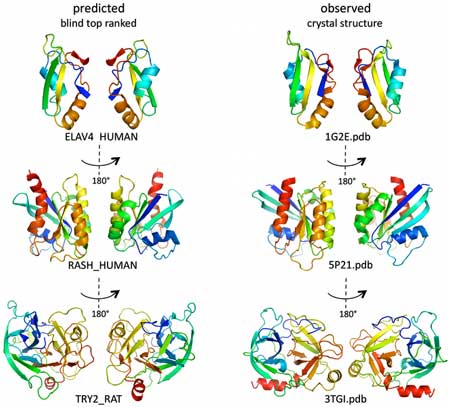



Proteomics, the study of the proteome, is important because proteins represent the actual functional molecules in the cell. When mutations occur in the DNA, it is the proteins that are ultimately affected. Drugs, when they have beneficial effects, do so by interacting with proteins….. Proteomics

Abundant, complex and variable, proteins provide the opportunity to directly identify what’s gone wrong in the body
Gene expression studies seem to be everywhere…..The Lights, Dr. Broderick, Dr. Klimas, the Dubbo group, Dr. Kerr, the CDC, etc. have all done gene expression studies. With all the emphasis on gene expression we tend to forget, though, that genes are just one half of the equation. Genes produce proteins, and it’s proteins that do most of the work in the body.
If I understand it right, gene expression results will need to be validated by finding increased or decreased levels of the proteins they encode Because one gene can produce multiple proteins, simply finding an over-expressed gene, unfortunately, doesn’t tell you which protein it produced.
Given that, why not go straight to where the action really is – the workers of the cells – and figure out what gone wrong with the proteins in ME/CFS. It turns out that charting the proteome is much more difficult than charting the genome. There are far more proteins (800,000) than genes (30,000), and with over 300 protein modifying chemicals found thus far, figuring out what a protein is and what it’s doing, is much more complex.
The complexity and cost of proteome studies, have prevented them from being used frequently in chronic fatigue syndrome. A Pubmed search of proteomics brought up only three ME/CFS proteomic studies – two on the spinal fluid and one on the plasma – all of which were successful.
(We still await the results of the Baraniuk followup to his spinal fluid proteome study. Two years ago Baraniuk stated they were positive, and even prepared some posters on them but they’ve remained unpublished. )
Enter the saliva. It’s easy accessibility and simpler composition relative to other bodily fluids makes it cheaper and easier to sample. (About 30% of the proteins found in the blood are found in saliva.)
With the last twin ME/CFS gene expression study flunking out (no genes were differentially expressed in the healthy vs the ME/CFS twins), these Italian researchers turned to proteins. They’ve been focused -successfully – on the study of proteomic biomarkers in the saliva of Sjogren’s Syndrome, rheumatoid arthritis and fibromyalgia patients for the past seven or eight years.
Now they’re turned to chronic fatigue syndrome (ME/CFS).
Small ‘Study’
This was a twin study. Twin studies provide a great opportunity to differentiate between the effects of genetics and the ‘environment’ (pathogens, toxins, diet, etc.) on illness. Thus far twin studies, unfortunately, have had mixed results; despite throwing alot of tests at her twins, the NIH Buchwald studies didn’t find a lot. (Her latest twin study is on personality and ME/CFS.)
The promise that twins present for elucidating the impact of our environment – the foods we eat, the pathogens we come across, the toxins we’re exposed to – nonetheless, remain. It’s always helpful to have twins to study.
This ‘study’ involved just one set of twins, but it was an intriguing set of twins. Their similar lifestyles, backgrounds, locations and even working environments made them an ideal pair to tease out what went wrong all of a sudden – for one of them.
Both twins were healthy into their thirties until one, directly after receiving an influenza vaccine, fell apart, losing weight and experiencing cognitive problems, fatigue, dizziness and fever. Ultimately, he ended up in the large ME/CFS clinic these researchers are associated with.
Results
The results were hopefull. A dramatic increase of the same CYA protein also upregulated in the saliva of Sjogren’s Syndrome and rheumatoid arthritis, suggested a possible connection between these three diseases. …
Four of the fourteen proteins found (including CYA) suggested a viral infection was present. Lower levels of two proteins (Ig alpha-1 IC, PiGr) that protect against pathogen invasion, including the gut lining, implicated the gut. Another set of proteins suggested the sick twin was in the throes of an overwrought inflammatory response.
Finally low levels of one protein (ZAG) that regulates energy production in the skeletal muscles, possibly provided a reason for the low energy levels in ME/CFS. This protein, interestingly, reduces oxidative stress in the muscles and counters muscle atrophy. High rates of muscle oxidative stress have been found in ME/CFS, several studies.
Thankfully, the findings of this study made sense given what we know about ME/CFS; the immune system was implicated, pathogens were a possibility, possible problems with energy production and oxidative stress showed up. That suggested they (and others) are on the right track.
Round Two Coming Up
The investigators were happy enough with the result to state this study would be round one in their efforts to understand ME/CFS. Next they’ll use these results to target specific proteins in a larger set of people with chronic fatigue syndrome. Proteome analyses may be complex and expensive but they’re enticing because they may be able to identify specific targets for drug interventions.







This sounds like really promising stuff. Changes in proteins and peptide chains (which include cytokines) can matter a lot in disease. According to Ken Abelikov in Biohazard, heart attacks and other sudden adverse events are caused in part by the overproduction of certain peptides, and such was the goal of genetically modified bioweapons the Soviets worked on (specifically, to target myelin sheath). The author also made a point of stating that all the vaccines he received for anthrax, etc. will likely shorten his life span.
I was surprised to learn how changeable proteins can be. Apparently they can be modified in all sorts of ways.
Interesting that a flu vaccination was the trigger. I have always thought that the trigger for my sis, a friend and I was a polio vaccine. As we all got sick and missed over 3 months of school and that triggered dysautonomia for all three of us. We know that we are all born with certain genes that may or may not mutate and change or “turn on” some inherited possible illness. Finding out the triggers and what started us onto the road to our dysfunction could be a big key. I was 8 years old and have had issues most of my life.
FYI, my dad got Guillian Barre from a flu shot and has never recovered from it.
There is also sojourns and other autoimmune things in my family.
If you do the 23&me genetic testing you can find out what all genes (that they test) you may have that could possibly cause issues later in life. Then you can download your info into a few other sites and find out even more with the different analysis. It is very interesting and may lead you to finding some answers. They have lowered the cost down recently.
Issie
I remain awaiting results from Baraniuk.
Great blog post, thanks!
Thanks….Me too…I was in that study! 🙂
Cort, I wondered if you were one of the twins in this study.
Issie